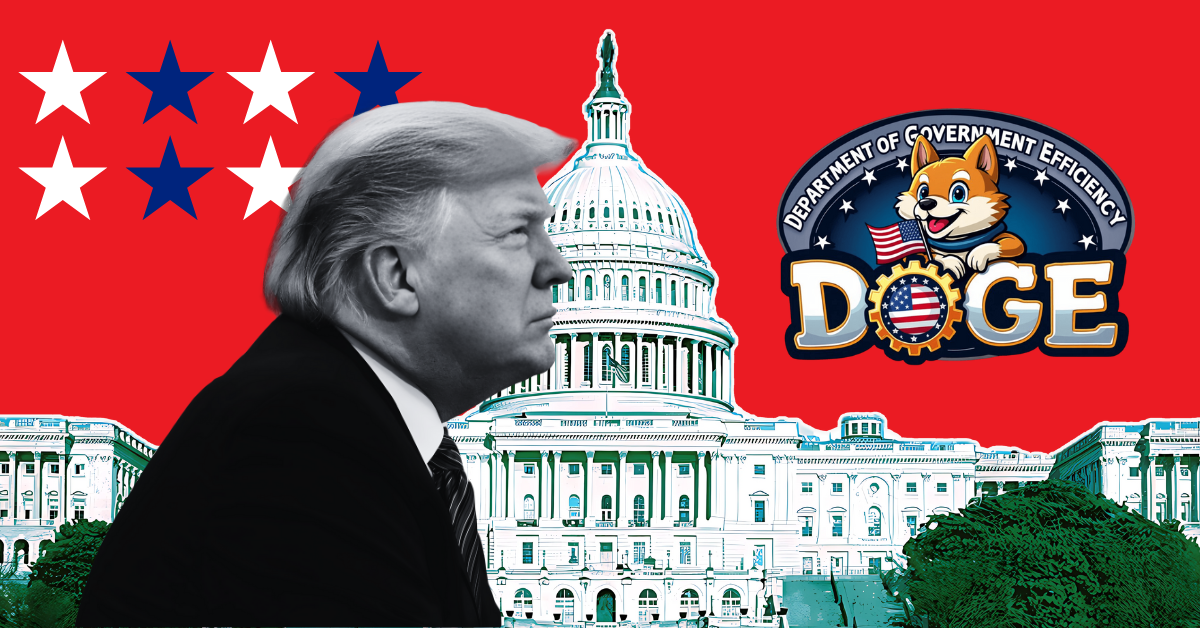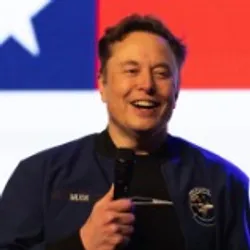
Trump’s new Department of Government Efficiency (DOGE) is saving the U.S. government $1 billion daily.
Key measures like freezing non-essential hires and cutting bureaucratic waste could save $365 billion annually.
If DOGE's savings continue, it could lower interest costs, stabilize bond yields, and help reduce inflation.
President Trump’s newly created Department of Government Efficiency (DOGE) is focused on reducing federal spending and improving operations. With the U.S. DOGE Service now under its control, the department aims to modernize government functions and cut costs. Remarkably, these efforts are already showing significant results just one week after Donald Trump

 Donald Trump
Donald J. Trump is a US-based business tycoon, pro-crypto politician, and 47th (present) President of the United States. He comprehends the significance and needs of the modern fintech world, and people look up to him as a dominant pro-crypto politician.
Once doubtful about Bitcoin's dominance, he said in a tweet in 2019, “I am not a fan of Bitcoin", but now has a significant amount of cryptocurrency holdings in his pool. He has also signed an Executive Order to establish a Strategic Bitcoin Reserve, which highlights his commitment to the future of cryptocurrency.
Quick Facts
Full name Donald John Trump Birth 14-06-1946, New York, United States Nationality American Education BS from the University of Pennsylvania Famous For Business, Politics
Donald Trump - Career Highlights & Events
2016 – Elected as the 45th President of the United States from the Republican Party. 2017 – Signed the Tax Cuts and Jobs Act, impacting investment environments 2019 – Slammed crypto king Bitcoin on X, calls it "not money". 2025 – A gala party was hosted by him for the top 220 Trump meme coin holders. President passed the executive order.
Donald Trump
Donald J. Trump is a US-based business tycoon, pro-crypto politician, and 47th (present) President of the United States. He comprehends the significance and needs of the modern fintech world, and people look up to him as a dominant pro-crypto politician.
Once doubtful about Bitcoin's dominance, he said in a tweet in 2019, “I am not a fan of Bitcoin", but now has a significant amount of cryptocurrency holdings in his pool. He has also signed an Executive Order to establish a Strategic Bitcoin Reserve, which highlights his commitment to the future of cryptocurrency.
Quick Facts
Full name Donald John Trump Birth 14-06-1946, New York, United States Nationality American Education BS from the University of Pennsylvania Famous For Business, Politics
Donald Trump - Career Highlights & Events
2016 – Elected as the 45th President of the United States from the Republican Party. 2017 – Signed the Tax Cuts and Jobs Act, impacting investment environments 2019 – Slammed crypto king Bitcoin on X, calls it "not money". 2025 – A gala party was hosted by him for the top 220 Trump meme coin holders. President passed the executive order.
More details below.
Early Success for the U.S. Government?
According to The Kobeissi Letter, DOGE has reportedly saved the U.S. government $1 billion per day since the new administration took office. If this trend continues, it could reduce the national deficit by $365 billion by January 2026—equivalent to a 20% cut in the FY2024 deficit of $1.8 trillion.
For context, the U.S. spent around $850 billion on defense in 2024, meaning DOGE’s savings could cover almost 43% of that budget. Additionally, with U.S. interest payments on debt reaching $882 billion last year, reducing the deficit by $365 billion could lower interest costs by over $12 billion annually.
The Three Key Strategies Behind DOGE’s Success
DOGE achieved these financial savings with three major steps: freezing non-essential hires, cutting DEI programs, and reducing improper payments overseas. By halting unnecessary hiring, trimming down bureaucratic waste, and ensuring taxpayer money isn’t lost abroad, DOGE is setting a new standard for fiscal discipline.
If these changes continue, they could save around $365 billion a year, which could be redirected to essential areas like infrastructure, healthcare, or national security.
Could DOGE Impact Interest Rates?
The Kobeissi Letter points out that to reduce the deficit by 50%, DOGE would need to boost daily savings to $2.5 billion. If deficit spending decreases, bond yields could also drop, reducing interest costs and starting a positive economic cycle.
With concerns over rising inflation and the deficit, the 10-year Treasury yield has increased by 100 basis points since rate cuts began. If DOGE’s efforts lead to lower government borrowing, yields could stabilize, saving U.S. consumers trillions in interest over the next decade.
Can DOGE Completely Eliminate the Deficit?
Fully eliminating the FY2024 deficit would require cutting $5 billion per day—five times the current savings rate. The last time the U.S. achieved a budget surplus was in 1998 under President Bill Clinton. If successful, Trump and Elon Musk


A New Hope for the U.S. Economy
While these results are encouraging, it’s still uncertain if DOGE can truly transform the U.S. economy. Nevertheless, the latest developments have caught the attention of the market, with DOGE—an underdog cryptocurrency—making waves in the U.S. economy.
If the current trend holds, the U.S. government may soon be able to look at its budget in a whole new light, with savings that benefit the country as a whole.
Never Miss a Beat in the Crypto World!
Stay ahead with breaking news, expert analysis, and real-time updates on the latest trends in Bitcoin, altcoins, DeFi, NFTs, and more.










